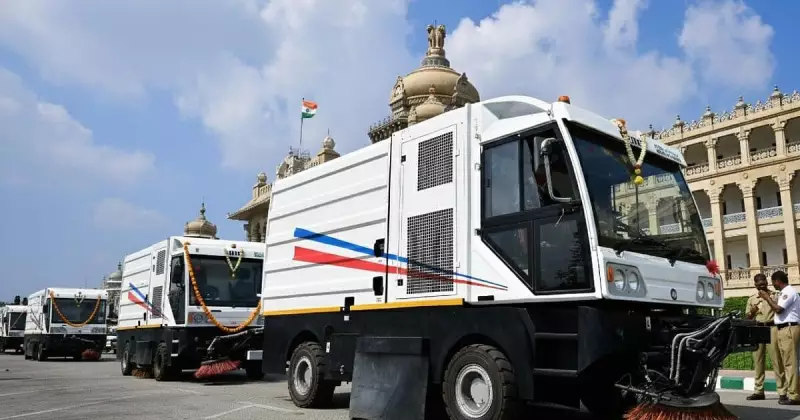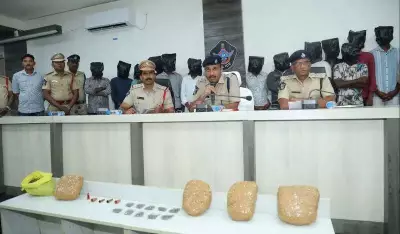
Bengaluru, India's technology capital, is grappling with a fundamental question about maintaining its urban cleanliness: should the city rent mechanical road sweepers or purchase them outright? The Bruhat Bengaluru Mahanagara Palike (BBMP) finds itself at a crossroads, weighing the financial and operational implications of both approaches in its quest for cleaner streets.
The Pilot Project That Sparked the Debate
In October 2023, BBMP launched an experimental initiative that brought this dilemma into sharp focus. The civic body deployed four mechanical sweeping machines across different zones of the city on a rental basis. These machines, operated by private contractors, were tasked with cleaning approximately 40 kilometers of roads daily, covering areas like Mahadevapura, Bommanahalli, and parts of the city center.
The rental arrangement came with a significant price tag. BBMP officials revealed that the corporation was paying ₹65,000 per month for each machine, totaling ₹2.6 lakh monthly for all four units. This cost included maintenance, fuel, and operator expenses handled by the private contractors. While this provided BBMP with immediate access to cleaning technology without large upfront investment, the long-term financial implications raised eyebrows among urban planning experts.
The Financial Mathematics of Cleaning
A deeper analysis of the costs reveals why this decision is so complex. BBMP's own calculations show that purchasing a mechanical sweeper outright would require an investment of ₹35-40 lakh per machine. At first glance, this appears substantially more expensive than the rental option. However, when spread over the machine's expected lifespan of 7-10 years, the purchase option might prove more economical.
"The rental model provides flexibility and avoids large capital expenditure," explained a senior BBMP official involved in the project. "But when we calculate the cumulative rental payments over five years, we're essentially paying the equivalent of purchasing two machines while owning none." This financial reality has prompted serious reconsideration of the current approach.
Operational Challenges and Efficiency Questions
Beyond the financial calculations, the pilot project uncovered several operational hurdles. The mechanical sweepers faced difficulties navigating Bengaluru's notorious traffic congestion, particularly during peak hours. Many narrower residential roads proved inaccessible to the large machines, limiting their effectiveness to major thoroughfares.
Furthermore, the 40 kilometers per day cleaning capacity fell short of expectations in some zones where road conditions and parked vehicles hampered progress. "The machines work well on wide, clear roads," noted a sanitation supervisor from Mahadevapura zone. "But in crowded commercial areas with constant vehicle movement, their efficiency drops significantly."
The quality of cleaning also varied. While the mechanical sweepers effectively collected loose debris and dust, they struggled with heavier waste and required manual follow-up in many areas. This raised questions about whether the technology could truly replace traditional manual sweeping or merely complement it.
The Human Element in Urban Sanitation
Complicating the decision further is the impact on Bengaluru's army of manual sanitation workers. The city employs thousands of pourakarmikas who have traditionally handled street cleaning. The introduction of mechanical sweepers has sparked concerns about job security among this workforce.
BBMP officials have been quick to reassure workers that mechanization aims to augment rather than replace human labor. "The machines handle the bulk cleaning of major roads, allowing our pourakarmikas to focus on areas the machines can't reach and on more detailed cleaning work," explained a BBMP spokesperson. Still, the tension between technological efficiency and employment preservation remains a sensitive issue.
Looking Ahead: BBMP's Strategic Decision
As the pilot project continues, BBMP is collecting data on cleaning efficiency, cost per kilometer, and public feedback. The corporation's Solid Waste Management Department is preparing a comprehensive report that will inform the final decision on whether to expand the rental program, switch to purchasing equipment, or adopt a hybrid model.
The timing is crucial as Bengaluru continues its struggle with urban cleanliness and waste management. With growing public expectations for cleaner cities and increasing pressure on municipal budgets, the sweeping machine dilemma represents a microcosm of the larger challenges facing Indian urban governance.
BBMP's final decision, expected in the coming months, will set a precedent for how Indian cities approach the balance between operational flexibility and long-term investment in urban infrastructure. The outcome could influence sanitation strategies across the country as metropolitan areas nationwide grapple with similar challenges.





